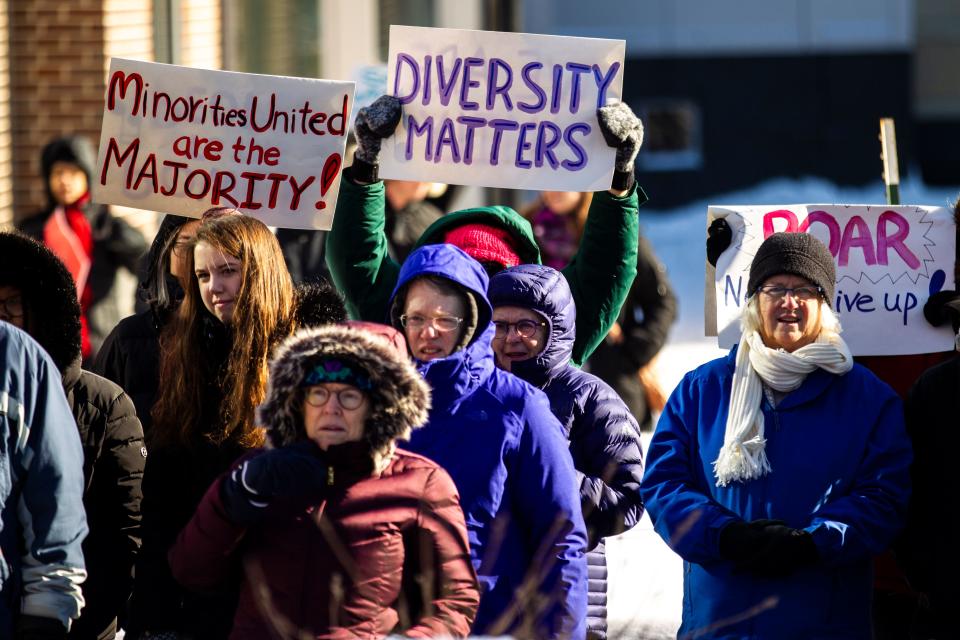California laws requiring women, minorities on corporate boards struck down. Will diversity suffer?
California laws requiring more women and people from underrepresented communities on corporate boards have been struck down in the courts.
Will increased diversity in the boardrooms of companies in California and beyond grind to a halt?
Clemson University associate professor Vincent Intintoli predicted the ruling would slow the "positive momentum of underrepresented director appointments to California boards."
Publicly traded companies headquartered in California added record numbers of women and people of color directors since the state passed the laws, research shows.
Boardroom diversity has become an urgent issue for corporations. Studies suggest that having greater diversity on corporate boards leads to better business outcomes.
Asian women shut out of leadership: Asian women are shut out of leadership at America's top companies. Our data shows why
Boardrooms predominantly white, male: We asked Walmart, Amazon, and others about hiring for diversity. What we found may surprise you
Yet a USA TODAY investigation last year found that board membership of the nation's largest and most valuable companies did not reflect the demographics of their workforces, let alone the nation's overall population. While white men make up about a third of U.S. workers, they held half or more of board seats, USA TODAY found.
California's board diversity law succeeded where voluntary measures foundered or failed, said Intintoli, who researched the effects of the law.
The "binding nature" of the California law – the threat of hefty fines for not complying – "seemed to be effective in encouraging these appointments," he said.
Judge rules board diversity law is unconstitutional
A Los Angeles judge ruled Friday that a California law requiring companies in the state to add female directors to their boards is unconstitutional because it violated the equal protection clause of the state’s constitution.
It was the second setback for the state’s groundbreaking laws that mandated – and got – more diversity on corporate boards.
The state argued the law was needed to combat discrimination and didn't set quotas because boards could add seats for women without removing men from their positions.
California boardrooms got more diverse after 2018 law
California companies in the Standard & Poor’s 500 made significant strides after state laws passed laws requiring more gender and racial diversity on corporate boards, according to DiversIQ, which analyzed changes in the board composition of 70 companies. At those companies, women secured nearly 100 new board seats since 2016, up nearly 12%.
Women now hold 239 board seats among these companies, which represents nearly a third of the total seats, DiversIQ said. California-based S&P 500 companies that have notably increased the number of women on their boards include Walt Disney, Intel, Ross Stores and eBay.
The California law passed in 2018 required that publicly traded companies headquartered in the state have at least two or three women on their boards or face hefty fines.

It was opposed by more than two dozen business groups, including the California Chamber of Commerce, which argued the gender quotas were “likely unconstitutional.”
Even then-Gov. Jerry Brown was hesitant to sign the bill, citing legal concerns, but did so anyway as the Me Too movement raged.
Another Los Angeles judge issued a similar ruling last month, striking down a law that required that public companies in California add at least one director who self-identifies as Black, Hispanic, Latino, Asian, Pacific Islander, Native American, Native Hawaiian or Alaska Native or as gay, lesbian, bisexual or transgender by 2021.
Judicial Watch opposed boardroom diversity laws
Conservative group Judicial Watch challenged both California laws in court, arguing they forced companies to discriminate based on gender and race.
“The radical left’s unprecedented attacks on anti-discrimination law has suffered another stinging defeat,” Judicial Watch President Tom Fitton said in a statement. “Thankfully, California courts have upheld the core American value of equal protection under the law."
The state laws, the first of their kind in the country, played a key role in increasing pressure on corporate boards to diversify.
In August, Nasdaq instituted a new policy requiring most of the nearly 3,000 companies listed on the stock exchange to disclose diversity data of their board directors. It also recommends that companies have at least two diverse directors. The Securities and Exchange Commission is facing a lawsuit over its approval of the Nasdaq rule.
BlackRock, State Street Global Advisors and big money managers now vote against directors on all-male boards to pressure them to add women. Goldman Sachs no longer underwrites initial public offerings for companies that don’t have at least two diverse directors.
Researchers told USA TODAY in February that they saw an increase in diverse directors on the boards of companies outside California, but the number of appointments by California companies was far greater.
At the current rate, it could take until 2045 for women to make up 50% of corporate boards, according to research from Morgan Stanley Capital International.
This article originally appeared on USA TODAY: California laws on board diversity struck down. Will diversity suffer?

 Yahoo Movies
Yahoo Movies 
